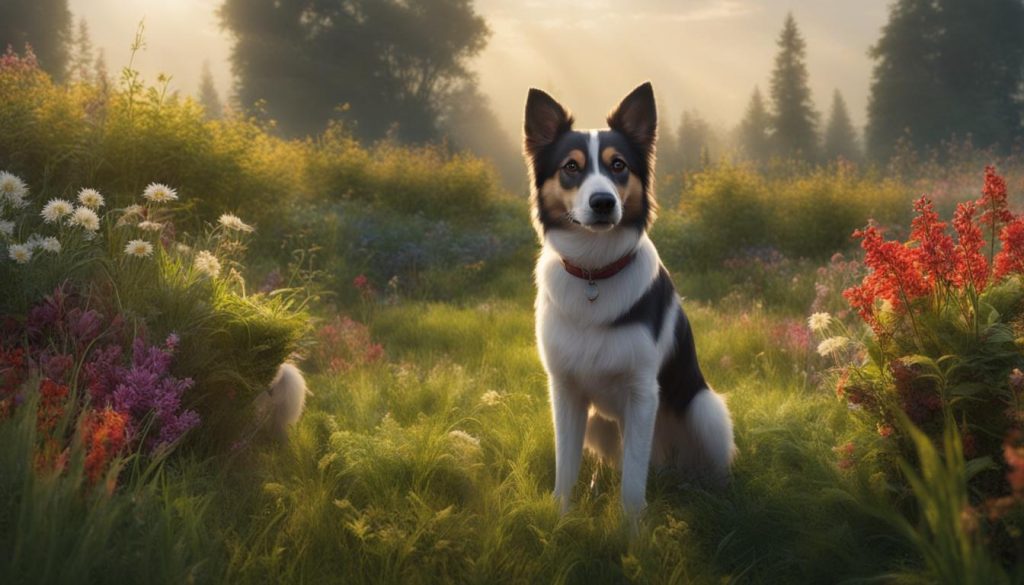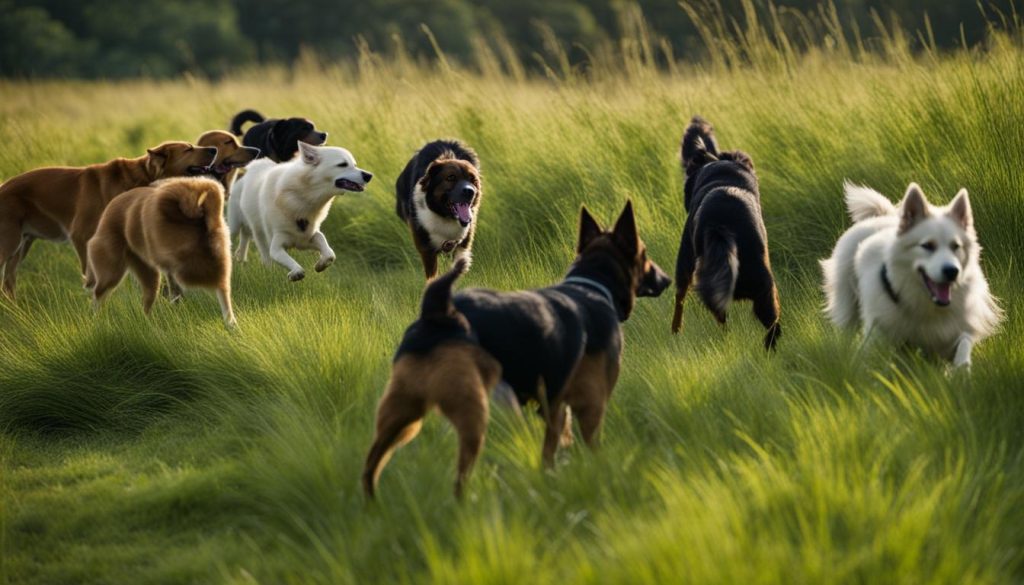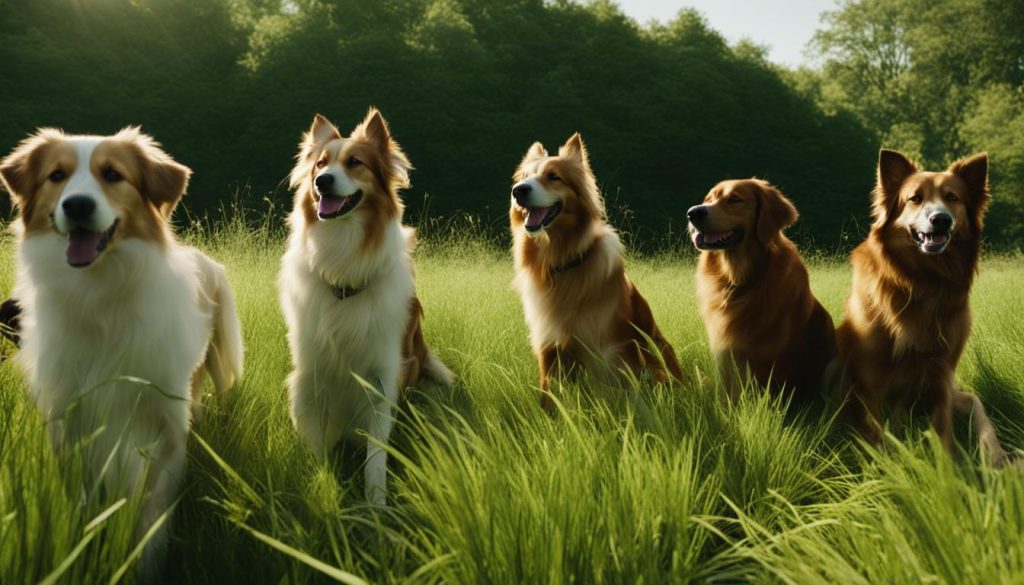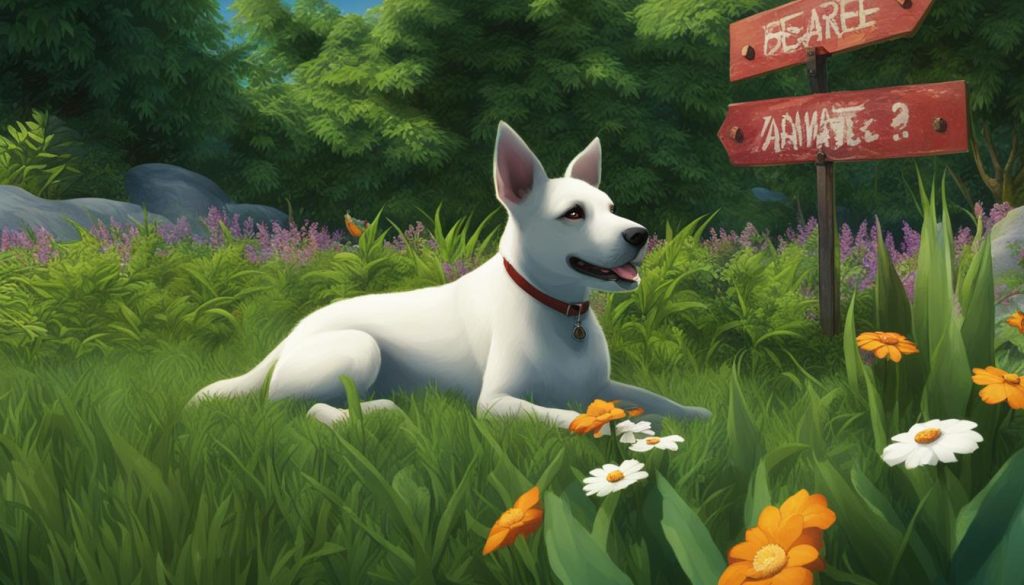Have you ever wondered why your dog has a habit of munching on grass? It’s a common behavior that many dog owners have observed, but the exact reasons behind it are still not fully understood. In this article, I will explore the various causes of dogs eating grass and provide some insights into this curious behavior.
Key Takeaways:
- Dogs may eat grass to soothe an upset stomach, for entertainment, or due to a nutritional deficiency.
- Eating grass can fulfill a physical need for roughage and fiber, aiding digestion.
- Some dogs eat grass out of boredom or as a way to seek attention from their owners.
- Dogs have ancestral instincts as scavengers, and eating grass may be a reflection of their natural behavior.
- While eating grass is generally not harmful, it’s important to ensure the grass is not contaminated with pesticides or fecal matter.
Is Eating Grass a Physical Need?
While dogs eating grass is a common behavior, many dog owners wonder if it is a physical need or if it can harm their furry friends. Eating grass may actually fulfill a physical need for dogs by providing them with roughage and fiber that aids in digestion. The grass acts as a natural way to stimulate bowel movements and can help relieve constipation.

However, it is important to pay attention to your dog’s behavior. If your dog shows signs of stomach discomfort, such as excessive drooling, pacing, or vomiting after eating grass, it is best to consult with a veterinarian. These symptoms may indicate an underlying medical condition that needs to be addressed.
Table:
| Signs of Stomach Discomfort | Possible Causes |
|---|---|
| Excessive drooling | Gastrointestinal upset |
| Pacing | Gastric ulcers |
| Vomiting after eating grass | Intestinal blockage |
In most cases, eating grass in moderation is not harmful to dogs. However, it is always best to monitor your dog’s grass-eating habits and ensure they are not consuming large amounts or contaminated grass. Taking precautions can help ensure your dog’s health and well-being.
Is Eating Grass a Psychological Need?
While eating grass may serve a physical purpose for dogs, it can also be driven by psychological needs. Some dogs engage in this behavior out of boredom or as a way to seek attention from their owners. Dogs are social animals, and they rely on mental stimulation and interaction with their environment to prevent boredom and destructive behaviors.
It is essential to provide dogs with regular exercise and playtime to keep them mentally and physically active. Engaging in interactive activities, such as playing fetch or puzzle toys, can help redirect their attention away from grass-eating. Additionally, consider introducing toys that are specifically designed to provide mental stimulation and enrichment for dogs.
If your dog shows a strong desire to eat grass, you can explore alternative options that can replicate the sensory experience of grass. Some dog-friendly ground covers, such as artificial turf or gravel, can offer a similar tactile sensation to grass without the need for ingestion. Creating a designated play area with these alternatives can help satisfy your dog’s cravings without compromising their health.
Preventing Grass Eating in Dogs
In addition to providing mental stimulation and alternatives to grass, training can play a crucial role in preventing grass eating. Training your dog to respond to basic commands, such as “leave it” or “drop it,” can help redirect their behavior when they show interest in grass. Positive reinforcement, such as treats or praise, can reinforce desired behaviors and discourage grass-eating.
If you notice that your dog tends to eat grass during certain times or in specific areas, consider modifying their environment to make those areas less accessible. For example, fencing off certain parts of your yard or using deterrent sprays can help discourage your dog from grazing on grass.
Remember, as a responsible pet owner, it is important to ensure that your dog’s diet is balanced and meets their nutritional needs. Consult with a veterinarian to determine if any dietary adjustments are necessary to address any underlying nutritional deficiencies that may contribute to grass-eating behavior.
| Preventing Grass Eating in Dogs | Benefits |
|---|---|
| Provide mental stimulation and interactive toys | Reduces boredom and redirects attention |
| Explore alternative ground covers | Satisfies sensory needs without grass ingestion |
| Train commands like “leave it” or “drop it” | Redirects behavior and reinforces desired actions |
| Modify the environment | Makes grass less accessible in certain areas |
| Ensure a balanced diet | Consult with a veterinarian to address any nutritional deficiencies |
Is Eating Grass an Instinct?
It is widely speculated that dogs eating grass may be a reflection of their natural scavenging behavior and instinct. Dogs are descendants of wolves, which were opportunistic hunters and scavengers. In the wild, wolves would consume the stomach contents of their prey, including grass and plants. This provided them with the fiber, nutrients, and even medicinal benefits they needed. Therefore, it is possible that dogs have retained this instinctual behavior of seeking out grass as a dietary supplement.
However, you should be aware that not all dogs exhibit this behavior, and the reasons behind it may vary. Some dogs may simply enjoy the taste and texture of grass, while others may use it as a means of self-soothing or to alleviate an upset stomach. Therefore, while instinct may play a role in dogs eating grass, it is not the sole explanation for this behavior.

Understanding the instinctual nature of dogs and their history as scavengers can provide some insight into why they may be inclined to eat grass. However, it is always important to monitor your dog’s behavior and ensure their safety. If you notice any unusual symptoms, consult with a veterinarian for proper guidance.
Dogs Enjoying Eating Grass
Some dogs have a peculiar fondness for eating grass, and while it may seem strange to us, it’s actually quite common. Dogs can exhibit a genuine enjoyment when snacking on grass, often showing excitement and enthusiasm for this activity. Whether it’s the taste, texture, or the satisfaction it brings, some dogs truly see themselves as connoisseurs of grass.
“My dog, Max, absolutely loves eating grass. Whenever we go for walks, he makes a beeline for any patch of green and starts munching away. It’s become a regular part of our routine, and I can tell he genuinely enjoys it.”
– Sarah, Dog Owner
While the exact reason why dogs enjoy eating grass is not fully understood, it’s important to recognize that not all dogs share this preference. Some may show little to no interest in grass, while others simply cannot resist the temptation. It’s a unique behavior that varies from dog to dog.
The Grass-Grazing Experience
For those dogs who do enjoy eating grass, it can be an enriching experience. The act of grazing on grass provides sensory stimulation, giving dogs the opportunity to explore different tastes and textures. It can also provide a sense of satisfaction and fulfillment, similar to how we might enjoy a favorite snack.
However, it’s essential to ensure that dogs have access to safe and non-toxic grass. Avoid areas that may have been treated with pesticides or herbicides, as these can be harmful if ingested. Additionally, be mindful of any potential risks such as parasites or contamination from other animals, as this can negatively impact your dog’s health.
| Benefits of Grass Eating in Dogs | Considerations to Keep in Mind |
|---|---|
|
|
Ultimately, if your dog enjoys eating grass and does so in moderation, it may not be a cause for concern. However, if you notice any signs of digestive discomfort, excessive grass consumption, or have any other concerns, it’s always best to consult with your veterinarian for guidance and peace of mind.

Should I Be Concerned About My Dog Eating Grass?
Many dog owners wonder if it is normal for dogs to eat grass and if it can harm their furry companions. While eating grass itself is generally not harmful to dogs, there are potential risks associated with ingesting pesticides or toxins that may be present on the grass. It is important to supervise dogs while they are eating grass and ensure they are not consuming large amounts or contaminated grass.
Ingesting grass that has been treated with herbicides or pesticides can pose health risks to dogs. These chemicals can cause gastrointestinal upset, allergic reactions, or even poisoning. Additionally, if a dog consumes large amounts of grass, it can lead to blockages in the digestive tract, which may require medical intervention. It is important to be aware of the potential dangers and take necessary precautions to keep dogs safe.
It is also essential to consider the source of the grass that dogs are eating. Grass contaminated with fecal matter from other animals can contain parasites or harmful bacteria, such as E. coli or Salmonella, which can cause serious health issues in dogs. Therefore, it is crucial to ensure that the grass your dog has access to is clean and free from potential hazards.
| Risks of Dogs Eating Grass | Precautions |
|---|---|
| Ingesting pesticides or herbicides | Avoid areas treated with chemicals and opt for organic or pesticide-free grass |
| Blockages in the digestive tract | Monitor your dog’s grass-eating behavior and ensure they do not consume excessive amounts |
| Contaminated grass with fecal matter | Maintain a clean and safe environment, and keep your dog away from areas with potential contamination |
If you are concerned about your dog’s grass-eating habits or notice any unusual symptoms, it is recommended to consult with a veterinarian. They can provide guidance specific to your dog’s health and address any underlying concerns. A veterinarian can also help evaluate your dog’s diet and ensure it meets their nutritional needs, which can reduce the likelihood of grazing on grass for nutritional deficiencies.

How Can I Stop My Dog from Eating Grass?
If your dog has a tendency to eat grass, there are several strategies you can employ to redirect this behavior and ensure their well-being. Here are some tips on how to stop your dog from eating grass:
1. Provide Sufficient Mental and Physical Stimulation
One of the reasons why dogs eat grass is due to boredom or a lack of mental and physical stimulation. Make sure your dog gets plenty of exercise and playtime to keep them engaged and satisfied. Interactive toys, puzzle feeders, and regular training sessions can also provide mental stimulation and prevent them from resorting to eating grass for entertainment.
2. Train and Redirect the Behavior
Training your dog to have alternative behaviors can help curb their desire to eat grass. Teach them commands such as “leave it” or “drop it” to discourage them from grazing. Whenever you catch your dog about to eat grass, redirect their attention to a more appropriate activity or offer them a treat or toy as a distraction.
3. Ensure a Balanced Diet
A well-balanced diet is essential in meeting your dog’s nutritional needs. Make sure you are feeding them high-quality dog food that provides all the necessary nutrients. If you suspect that your dog’s grass-eating behavior is due to a nutritional deficiency, consult with a veterinarian to determine the best course of action.
| Preventing Grass Eating in Dogs | Summary |
|---|---|
| Provide mental and physical stimulation | Maintain an active lifestyle for your dog |
| Train and redirect the behavior | Teach alternative commands and offer distractions |
| Ensure a balanced diet | Feed high-quality dog food and consult a veterinarian if needed |
By implementing these strategies, you can help prevent your dog from eating grass and ensure their overall well-being. Remember to consult with a veterinarian if you have any concerns or if your dog’s grass-eating behavior persists despite your best efforts.
Can Eating Grass Be a Sign of Dietary Deficiency in Dogs?
While eating grass is a common behavior in dogs, it does not necessarily indicate a dietary deficiency. Most dogs on well-balanced commercial diets should receive all the necessary nutrients and vitamins they need. However, there are certain circumstances where eating grass could be a sign of an underlying nutritional issue.
In some cases, dogs may consume grass to supplement their diet with additional fiber. If a dog’s regular food lacks sufficient fiber content, they may seek out grass as a natural source of roughage. However, you should be aware that there are other, more appropriate sources of fiber that can be incorporated into a dog’s diet, such as pumpkin or green vegetables.
If you suspect that your dog’s diet may be lacking certain nutrients, it is best to consult with a veterinarian. They can evaluate your dog’s current diet and recommend any necessary changes or supplements to ensure they are receiving a balanced and nutritionally complete diet.
Table: Common Dietary Deficiencies in Dogs
| Nutrient | Possible Signs of Deficiency |
|---|---|
| Protein | Poor coat quality, muscle wasting |
| Omega-3 Fatty Acids | Flaky skin, dull coat, joint stiffness |
| Vitamin A | Poor vision, dry skin, weakened immune system |
| Vitamin D | Rickets, weakened bones, stunted growth |
| Iron | Anemia, lethargy, pale gums |
Final Thoughts
In most cases, dogs eating grass is a normal behavior that may have varying reasons. While it is generally not a cause for concern, it is essential to ensure that your dog’s diet is well-balanced and meets their nutritional needs. If you suspect any deficiencies or have concerns about their diet, consult with a veterinarian who can provide expert advice and guidance.
Can Eating Grass Harm Dogs?
Eating grass itself is generally not harmful to dogs. In fact, it can provide them with some benefits such as aiding digestion and fulfilling their need for fiber. However, there are certain situations where eating grass can pose health risks to dogs.
If a dog ingests grass that has been treated with herbicides or pesticides, it can lead to poisoning. These chemicals can be toxic to dogs and may cause symptoms such as vomiting, diarrhea, and even more serious complications depending on the amount ingested.
Another risk associated with eating grass is the potential for parasites. If a dog consumes grass that has been contaminated with fecal matter from other animals, it can increase the chances of contracting parasites like roundworms or giardia. These parasites can cause various health issues and require proper treatment.
Table: Risks Associated with Eating Grass
| Risk | Description |
|---|---|
| Poisoning from chemicals | Grass treated with herbicides or pesticides can be toxic to dogs and cause symptoms like vomiting and diarrhea. |
| Parasite infection | Grass contaminated with fecal matter can lead to the ingestion of parasites like roundworms or giardia. |
It is important to keep an eye on your dog while they are eating grass and ensure they are not consuming large amounts or grass that may be contaminated. If you suspect your dog has ingested grass that may be harmful, it is best to consult with a veterinarian for proper evaluation and guidance.
Avoiding the use of herbicides and pesticides on your lawn and keeping it clean from fecal matter can help reduce the risks associated with eating grass. Providing your dog with a safe and well-maintained environment, along with a balanced diet and regular veterinary care, can help ensure their overall health and well-being.

Disclaimer: The information provided in this article is for educational purposes only and does not substitute professional veterinary advice. If you have any concerns or questions about your dog’s health, consult with a qualified veterinarian.
Are There Alternatives to Grass for Dogs?
While many dogs enjoy the occasional nibble on grass, some owners may prefer to offer their furry companions alternative options to satisfy their cravings. Here are some dog-friendly yard alternatives to grass that can provide both visual appeal and a safe environment for your pet.
1. Artificial Turf
Artificial turf is a popular choice for dog owners looking to replace natural grass. It offers a low-maintenance solution and provides a consistent and durable surface for dogs to play on. Additionally, artificial turf eliminates the need for pesticides, fertilizers, and regular watering, making it an eco-friendly choice as well.
2. Dog-Friendly Ground Cover
There are several dog-friendly ground cover options that can be used instead of grass. One popular choice is pea gravel, which provides good drainage and is easy to clean. Another option is wood chips or bark, which can create a natural and visually appealing surface for dogs to explore. It is important to choose a ground cover that is non-toxic, does not pose a choking hazard, and is comfortable for your dog to walk on.
3. Safe and Non-Toxic Plants
Creating a dog-friendly yard can also involve incorporating safe and non-toxic plants. Consider selecting plants that are not harmful to dogs if ingested. Some examples of dog-friendly plants include lavender, rosemary, and sunflowers. It is recommended to research and consult with a professional to ensure the chosen plants are suitable for the specific needs of your dog.
By providing alternative options to grass, dog owners can create a dog-friendly environment that is both aesthetically pleasing and safe for their furry companions. Whether it’s artificial turf, dog-friendly ground cover, or non-toxic plants, these alternatives can help redirect your dog’s behavior and provide them with a stimulating outdoor space to explore and play.
| Alternative | Advantages | Considerations |
|---|---|---|
| Artificial Turf | Low maintenance, consistent surface, eco-friendly | Potential for heat build-up, initial installation cost |
| Dog-Friendly Ground Cover | Good drainage, easy to clean, natural appearance | Potential for displacement, not suitable for heavy digging |
| Safe and Non-Toxic Plants | Natural decor, pleasant aroma, attracts beneficial insects | Potential for ingestion, may require regular pruning |
Final Thoughts
To summarize, there are various reasons why dogs eat grass. Some dogs may eat grass to soothe an upset stomach, while others do it out of boredom or to seek attention. It may also be an instinctual behavior inherited from their ancestors, who consumed grass as part of their natural scavenging habits. Additionally, some dogs simply enjoy the taste and texture of grass.
While eating grass is generally not a cause for concern, it is important to monitor your dog’s behavior and ensure their safety. Avoid allowing them to consume large amounts of grass or grass that may be contaminated with pesticides or toxins. If you notice any unusual symptoms or have concerns about your dog’s health, consult with a veterinarian for proper guidance.
Remember, a well-balanced diet is essential for your dog’s overall health and nutritional needs. Most dogs on commercial diets should not be lacking in nutrients, but if you have concerns about your dog’s diet, it is advisable to consult with a veterinarian to ensure they are getting the proper nutrition.
In summary, understanding why dogs eat grass can help us address their needs and ensure their well-being. By providing mental and physical stimulation, offering alternative treats or toys, and creating a dog-friendly environment, we can help redirect their grass-eating behavior and keep them happy and healthy.
FAQ
Why does my dog eat grass?
Dogs may eat grass for various reasons, including to soothe an upset stomach, as a form of entertainment, or due to a nutritional deficiency.
Is eating grass a physical need?
Eating grass may fulfill a physical need for dogs by providing them with roughage and fiber that aids in digestion.
Is eating grass a psychological need?
Some dogs may eat grass out of boredom or as a way to seek attention from their owners. Providing mental stimulation, toys, and regular exercise can help address this psychological need and reduce the desire to eat grass.
Is eating grass an instinct?
Dogs have ancestral instincts as scavengers, and eating grass may be a reflection of their natural behavior. Dogs in the wild often consumed the stomach contents of their prey, including grass and plants, which provided them with the fiber and nutrients they needed.
Do dogs like eating grass?
Some dogs simply enjoy the taste and texture of grass. It is not uncommon for dogs to have preferences for certain types of grass or to show more interest in grazing during certain seasons.
Should I be concerned about my dog eating grass?
Eating grass itself is generally not harmful to dogs, but there are potential risks associated with ingesting pesticides or toxins that may be present on grass. It is important to supervise dogs while they are eating grass and ensure they are not consuming large amounts or contaminated grass.
How can I stop my dog from eating grass?
Training and redirecting the behavior of dogs that eat grass can be achieved through positive reinforcement, offering alternative treats or toys, and providing mental and physical stimulation. It is also important to ensure that the dog’s diet is balanced and meets their nutritional needs.
Can eating grass be a sign of dietary deficiency in dogs?
While eating grass can be a sign of a dietary deficiency in some cases, most dogs on well-balanced commercial diets should not be lacking in nutrients. If concerned about a dog’s diet, it is advisable to consult a veterinarian for guidance and proper nutritional assessment.
Can eating grass harm dogs?
While grass itself is not harmful to dogs, ingesting grass that has been treated with herbicides or pesticides can pose health risks. Additionally, if a dog consumes large amounts of grass or if the grass is contaminated with fecal matter from other animals, there is a risk of contracting parasites.
Are there alternatives to grass for dogs?
For dogs that have a strong urge to eat grass, providing alternative options can help redirect their behavior. Creating dog-friendly yards with safe and non-toxic plants, installing artificial turf, or providing designated areas with dog-friendly ground cover can all be effective alternatives.
Final Thoughts
To summarize, there are various reasons why dogs eat grass, including physical and psychological needs, instinctual behavior, and personal preference. While eating grass is generally not a cause for concern, monitoring your dog’s behavior and ensuring their safety and nutritional needs are met is important. If you have any concerns or notice any unusual symptoms, consult with a veterinarian for proper guidance.






